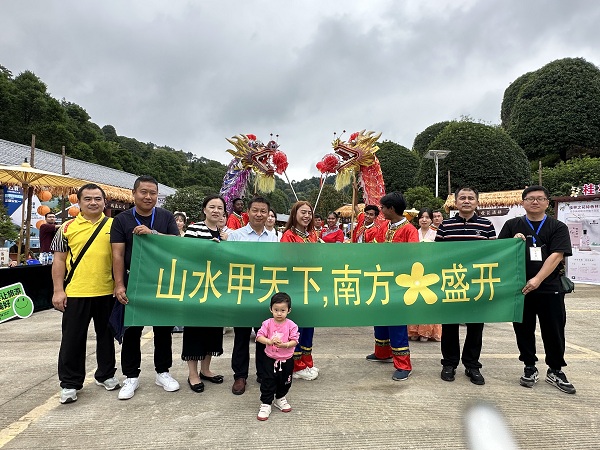Osmanthus flower industry brings sweet life to Lingui farmers

An aerial view of Lingui district. [Photo provided to en.gxzf.gov.cn]
The second South China Flower and Seedling Trade Fair and the fourth Guangxi Flower and Seedling Trade Fair (Lingui sub-venue) was held in Lingui district of Guilin, Guangxi Zhuang autonomous region, on Oct 19.
Guilin is known for its abundance of osmanthus flowers, and Lingui district is one of the main osmanthus flower cultivation areas in the city.
Currently, tourists from all over the country come here to enjoy the pleasant fragrance of these flowers, and the osmanthus economy in Lingui district is continuing to grow. A relatively complete industrial chain has been formed around the planting, harvesting, drying and deep processing of osmanthus flowers.

A group of attendees of the second South China Flower and Seedling Trade Fair and the fourth Guangxi Flower and Seedling Trade Fair (Lingui sub-venue) pose for a group photo. [Photo provided to en.gxzf.gov.cn]
Lingui has developed a seedling cultivation industry, with 16,000 mu (1,067 hectares) of osmanthus seedlings alone. With an annual output value of 130 million yuan ($18 million), it is the largest osmanthus planting base in Guangxi.
At the same time, Lingui has the largest South China sika deer breeding base. The annual output value of the town's "enterprise + farmers" animal husbandry model reaches 290 million yuan.
Currently, Lingui has about 100,000 mu (6,667 hectares) of osmanthus trees, with osmanthus trees over 10 centimeters accounting for about 70 percent of that total. The main varieties include golden osmanthus and silver osmanthus, with four seasons osmanthus and red osmanthus as auxiliary varieties.
There are more than 30 osmanthus collection and processing enterprises and workshops in the district, producing a variety of products such as osmanthus tea, osmanthus wine, osmanthus cake, and osmanthus essential oil. The annual output value of the district's osmanthus industry has reached 1 billion yuan.














